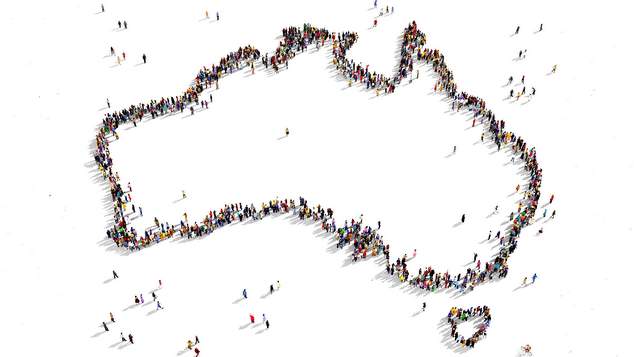The Australian Bureau of Statistics (ABS) released experimental estimates of LGBTI+ populations. These estimates are the first of their kind in Australia.
In a new approach, the ABS combined data from nearly 45,000 people who responded to one of four recent ABS health surveys to shed light on LGBTI+ people in Australia.
Linda Fardell, ABS head of health statistics, said the data showed nearly a million people in Australia were gay, lesbian, bisexual, transgender or intersex.
“The new data shows that about 4.5 per cent of all Australians 16 years and older are LGBTI+; that’s over 900,000 people.’
“Younger Australians are more likely to be LGBTI+. Nearly 10 per cent of Australians aged 16 to 24 years are LGBTI+.” Fardell said.

According to the research about 740,000 Australians are lesbian, gay, bisexual or use a different term to describe their sexual orientation. That’s 3.6 per cent of Australians. One in three LGB+ Australians are married or in a de facto relationship.
Nearly 1 per cent of Australians are trans and gender diverse. This includes trans men, trans women and non-binary people. That’s around 178,900 Australians.
‘About 0.3 per cent of Australians report they know they were born with variations of sex characteristics – that’s around 63,300 people,’ Fardell said.
The Australian figures are very similar to New Zealand’s 2023 Census data. As in Australia, 3.6% of New Zealanders are lesbian, gay, bisexual or use a different term to describe their sexual orientation. Around 0.9 per cent of Australians and 0.6 per cent of New Zealanders are trans and gender diverse.
The 2026 Australian Census will include questions on gender and sexual orientation for people aged 16 years and over. This will provide more detailed data by geography and population characteristics for LGB+ and trans and gender diverse populations in Australia.
The ABS would like to thank participants in ABS surveys for contributing to these important findings. More information can be found from Estimates and characteristics of LGBTI+ populations in Australia on the ABS website.
Just.Equal says report should be a signal for political parties to take LGBTIQA+ rights seriously
Political advocacy group Just.Equal says the results of the report should be something political parties take note of.
They note the number of LGBTI poeple identified is roughly equivalent to one in 27 Australians or the populations of the ACT and Tasmania combined and is likely to be an under-estimate given some LGBTI+ people, including the elderly and transgender people, may be less comfortable disclosing who they are.
Just.Equal spokesperson, Rodney Croome, said political parties should take note ahead of the federal election.
“The ABS estimate highlights that LGBTI+ people are a key constituency and a powerful voting bloc ahead of next year’s federal election.”
“This constituency is even larger when we include the families, friends and allies of LGBTI+ people.”
“The ABS data is a reminder to all political parties that they must have policies recognising the human rights of LGBTI+ people and addressing the disadvantages we face in areas such as health, housing, employment, education and public safety.”
“This data will also help foster inclusion and equity in the broader community by reminding non-LGBTI+ Australians that we a substantial part of Australian society and that we make an important contribution to national life.” Coome said.
They also noted that the ABS’s estimate corresponds with similar estimates in New Zealand and the UK.
InterAction for Health and Human Rights welcome the findings
InterAction for Health and Human Rights, the organisation that champions the needs of people with innate variations of sex characteristics and their families, welcomed the announcement.
The information on Australia’s who are intersex was based on the question “Were you born with a variation of sex characteristics, sometimes called ‘intersex’ or ‘DSD’?”.
The advocacy group says including each of these terms helps to clarify the population that the question intends to count, and names all of the key umbrella terms that respondents may have heard.
They note that obtaining reliable information on the number of people who are intersex or have a innate variations in sex characteristics (IVSC) remains challenging.
“The references to people who “report they know” highlight the difficulties we have identified in counting people with innate variations of sex characteristics, including a legacy of secrecy and non-disclosure by clinicians to people with IVSCs. 0.7% of respondents gave the response “don’t know”, and this is higher than those responding “yes”.
“The ABS analysis sought to identify impacts from misconceptions that conflate IVSCs with LGBT identities and it established that false positives from endosex (non-intersex) transgender people were unlikely.” the group said in a statement.
“While these data cannot give us a count of the actual total number of people with IVSCs, these findings are a first step. As comprehension of our population improves, and with better reporting that respects the distinct nature of this variable, we can expect improvements to data quality over time.
InterAction supports the collection of data on the number and circumstances of people with innate variations of sex characteristics. The organisation has worked with the Australian Bureau of Statistics to develop norms and standards in order to do this respectfully, and in a context where intersex people continue to often be counted in inappropriate ways.
Executive Director of InterAction for Health and Human Rights, Dr Morgan Carpenter said the new approach was encouraging.
“I’m glad of engagement by the ABS over many years to find ways of respectfully counting intersex people. Misconceptions linking intersex to gender and sexuality, and legacies of clinical secrecy, make this complicated.
“These mean that the findings do not give us a count of people with innate variations of sex characteristics, but they provide a crucial first step that can be built on in the years ahead.” Dr Carpenter said.




